University Dissertation: Antidepressants and Dementia in Nursing Homes
VerifiedAdded on 2022/12/29
|52
|13064
|74
Thesis and Dissertation
AI Summary
This dissertation presents a systematic review investigating the use of antidepressants in elderly patients (65-85 years) with dementia residing in nursing homes. The study examines the association between depression and dementia, exploring both pharmacological and non-pharmacological interventions for managing depressive symptoms. The review analyzes the efficacy of antidepressants, particularly SSRIs, considering the limitations and potential adverse effects. The methodology includes a systematic search strategy, relevance assessment, and thematic analysis of selected articles. The findings highlight the importance of nurses' knowledge and training, the role of non-pharmacological interventions, and the need for person-centered care. The review identifies gaps in current research and offers recommendations for improved evidence-based practice in mental health nursing, emphasizing the complexity of antidepressant use and the importance of considering alternative treatments and patient-specific needs.
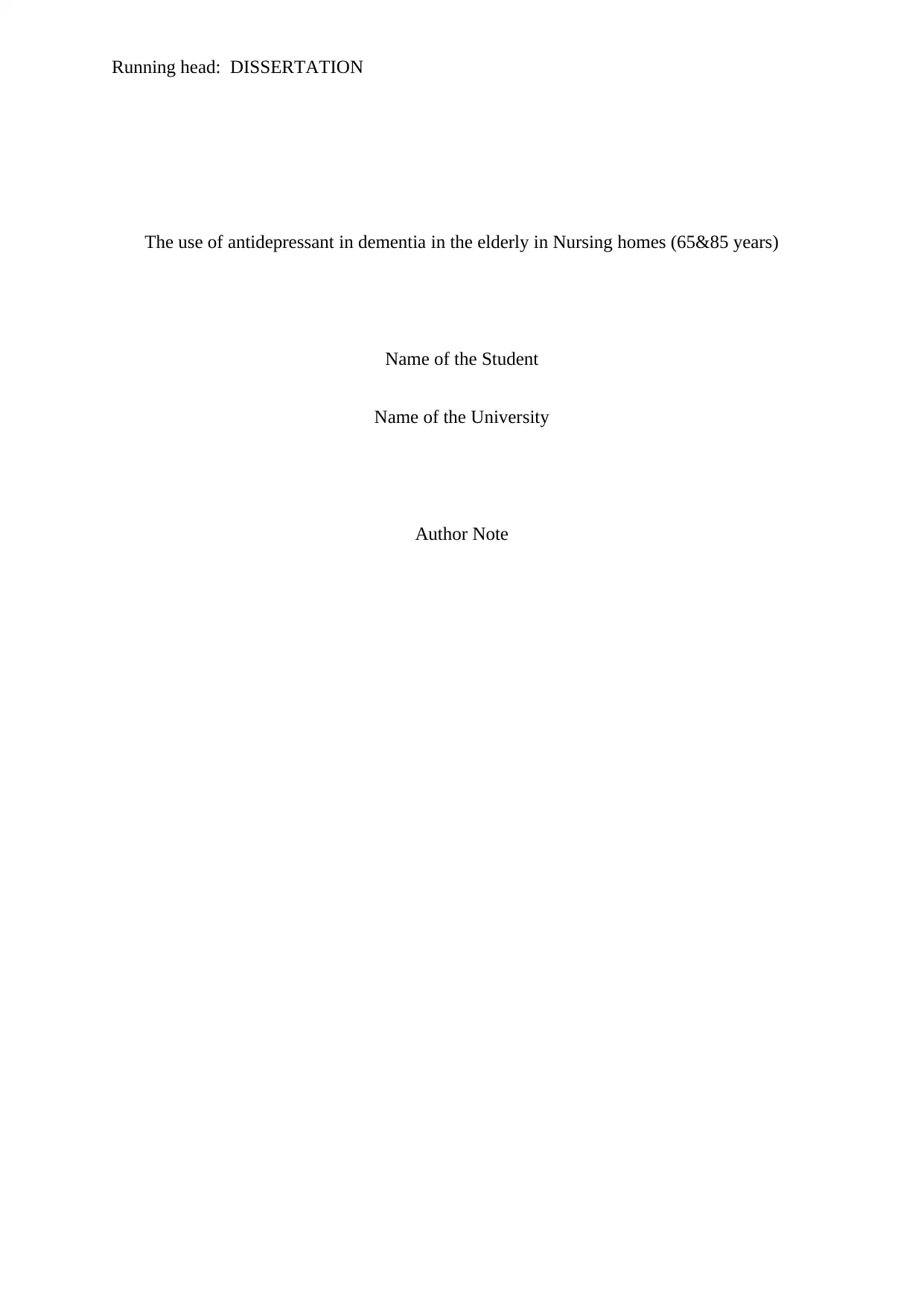
Running head: DISSERTATION
The use of antidepressant in dementia in the elderly in Nursing homes (65&85 years)
Name of the Student
Name of the University
Author Note
The use of antidepressant in dementia in the elderly in Nursing homes (65&85 years)
Name of the Student
Name of the University
Author Note
Paraphrase This Document
Need a fresh take? Get an instant paraphrase of this document with our AI Paraphraser
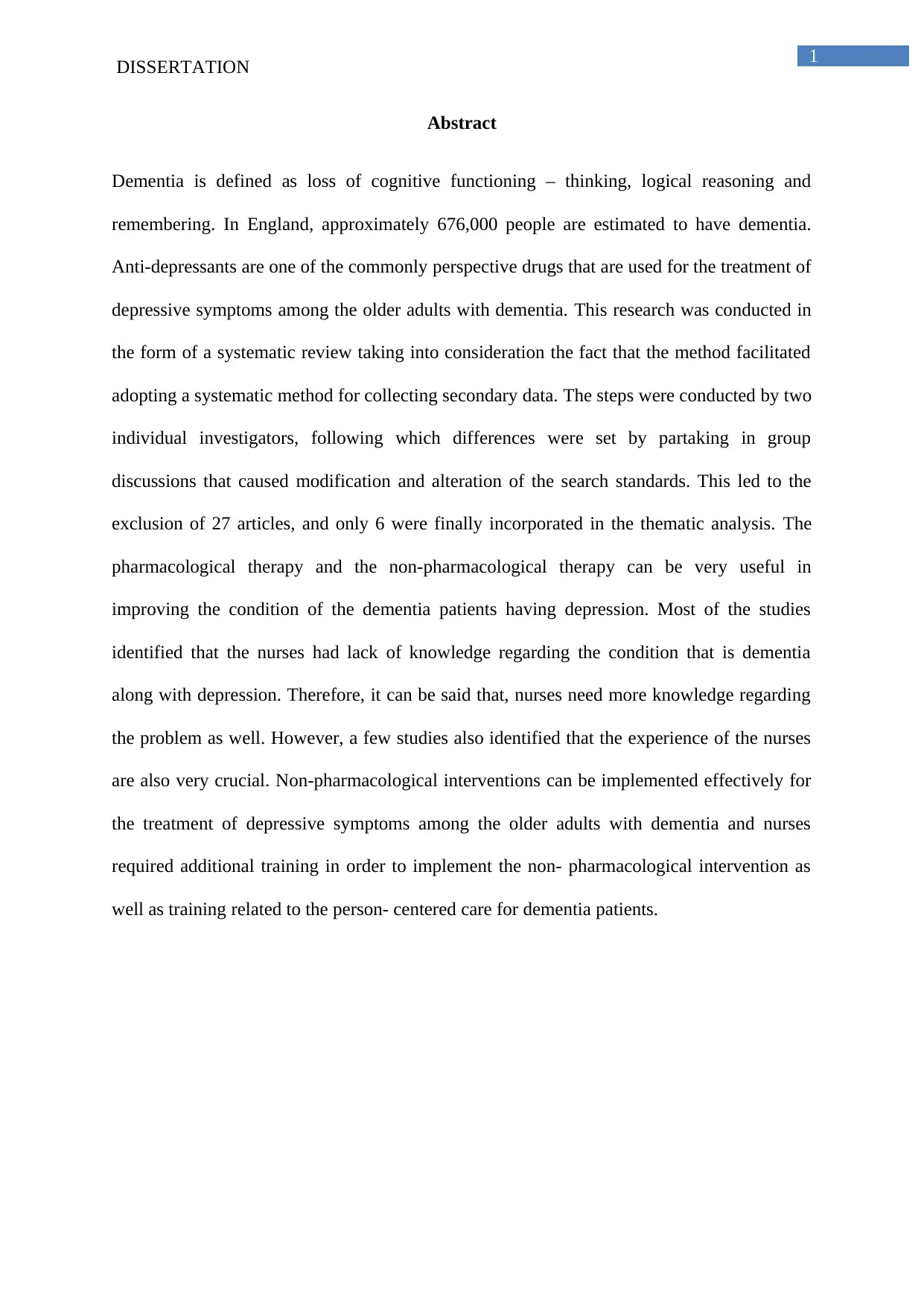
1
DISSERTATION
Abstract
Dementia is defined as loss of cognitive functioning – thinking, logical reasoning and
remembering. In England, approximately 676,000 people are estimated to have dementia.
Anti-depressants are one of the commonly perspective drugs that are used for the treatment of
depressive symptoms among the older adults with dementia. This research was conducted in
the form of a systematic review taking into consideration the fact that the method facilitated
adopting a systematic method for collecting secondary data. The steps were conducted by two
individual investigators, following which differences were set by partaking in group
discussions that caused modification and alteration of the search standards. This led to the
exclusion of 27 articles, and only 6 were finally incorporated in the thematic analysis. The
pharmacological therapy and the non-pharmacological therapy can be very useful in
improving the condition of the dementia patients having depression. Most of the studies
identified that the nurses had lack of knowledge regarding the condition that is dementia
along with depression. Therefore, it can be said that, nurses need more knowledge regarding
the problem as well. However, a few studies also identified that the experience of the nurses
are also very crucial. Non-pharmacological interventions can be implemented effectively for
the treatment of depressive symptoms among the older adults with dementia and nurses
required additional training in order to implement the non- pharmacological intervention as
well as training related to the person- centered care for dementia patients.
DISSERTATION
Abstract
Dementia is defined as loss of cognitive functioning – thinking, logical reasoning and
remembering. In England, approximately 676,000 people are estimated to have dementia.
Anti-depressants are one of the commonly perspective drugs that are used for the treatment of
depressive symptoms among the older adults with dementia. This research was conducted in
the form of a systematic review taking into consideration the fact that the method facilitated
adopting a systematic method for collecting secondary data. The steps were conducted by two
individual investigators, following which differences were set by partaking in group
discussions that caused modification and alteration of the search standards. This led to the
exclusion of 27 articles, and only 6 were finally incorporated in the thematic analysis. The
pharmacological therapy and the non-pharmacological therapy can be very useful in
improving the condition of the dementia patients having depression. Most of the studies
identified that the nurses had lack of knowledge regarding the condition that is dementia
along with depression. Therefore, it can be said that, nurses need more knowledge regarding
the problem as well. However, a few studies also identified that the experience of the nurses
are also very crucial. Non-pharmacological interventions can be implemented effectively for
the treatment of depressive symptoms among the older adults with dementia and nurses
required additional training in order to implement the non- pharmacological intervention as
well as training related to the person- centered care for dementia patients.
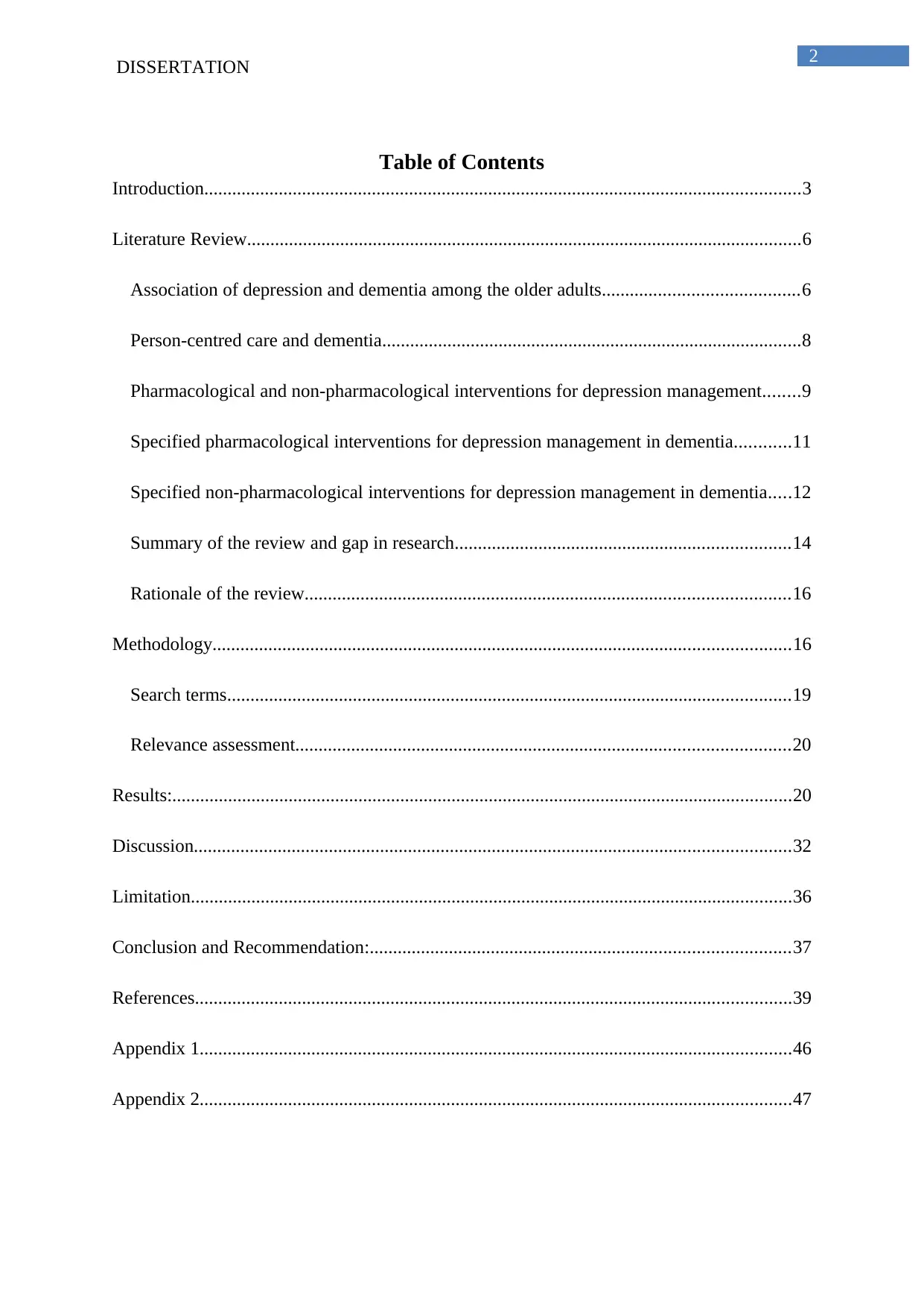
2
DISSERTATION
Table of Contents
Introduction................................................................................................................................3
Literature Review.......................................................................................................................6
Association of depression and dementia among the older adults..........................................6
Person-centred care and dementia..........................................................................................8
Pharmacological and non-pharmacological interventions for depression management........9
Specified pharmacological interventions for depression management in dementia............11
Specified non-pharmacological interventions for depression management in dementia.....12
Summary of the review and gap in research........................................................................14
Rationale of the review........................................................................................................16
Methodology............................................................................................................................16
Search terms.........................................................................................................................19
Relevance assessment..........................................................................................................20
Results:.....................................................................................................................................20
Discussion................................................................................................................................32
Limitation.................................................................................................................................36
Conclusion and Recommendation:..........................................................................................37
References................................................................................................................................39
Appendix 1...............................................................................................................................46
Appendix 2...............................................................................................................................47
DISSERTATION
Table of Contents
Introduction................................................................................................................................3
Literature Review.......................................................................................................................6
Association of depression and dementia among the older adults..........................................6
Person-centred care and dementia..........................................................................................8
Pharmacological and non-pharmacological interventions for depression management........9
Specified pharmacological interventions for depression management in dementia............11
Specified non-pharmacological interventions for depression management in dementia.....12
Summary of the review and gap in research........................................................................14
Rationale of the review........................................................................................................16
Methodology............................................................................................................................16
Search terms.........................................................................................................................19
Relevance assessment..........................................................................................................20
Results:.....................................................................................................................................20
Discussion................................................................................................................................32
Limitation.................................................................................................................................36
Conclusion and Recommendation:..........................................................................................37
References................................................................................................................................39
Appendix 1...............................................................................................................................46
Appendix 2...............................................................................................................................47
⊘ This is a preview!⊘
Do you want full access?
Subscribe today to unlock all pages.

Trusted by 1+ million students worldwide

3
DISSERTATION
DISSERTATION
Paraphrase This Document
Need a fresh take? Get an instant paraphrase of this document with our AI Paraphraser
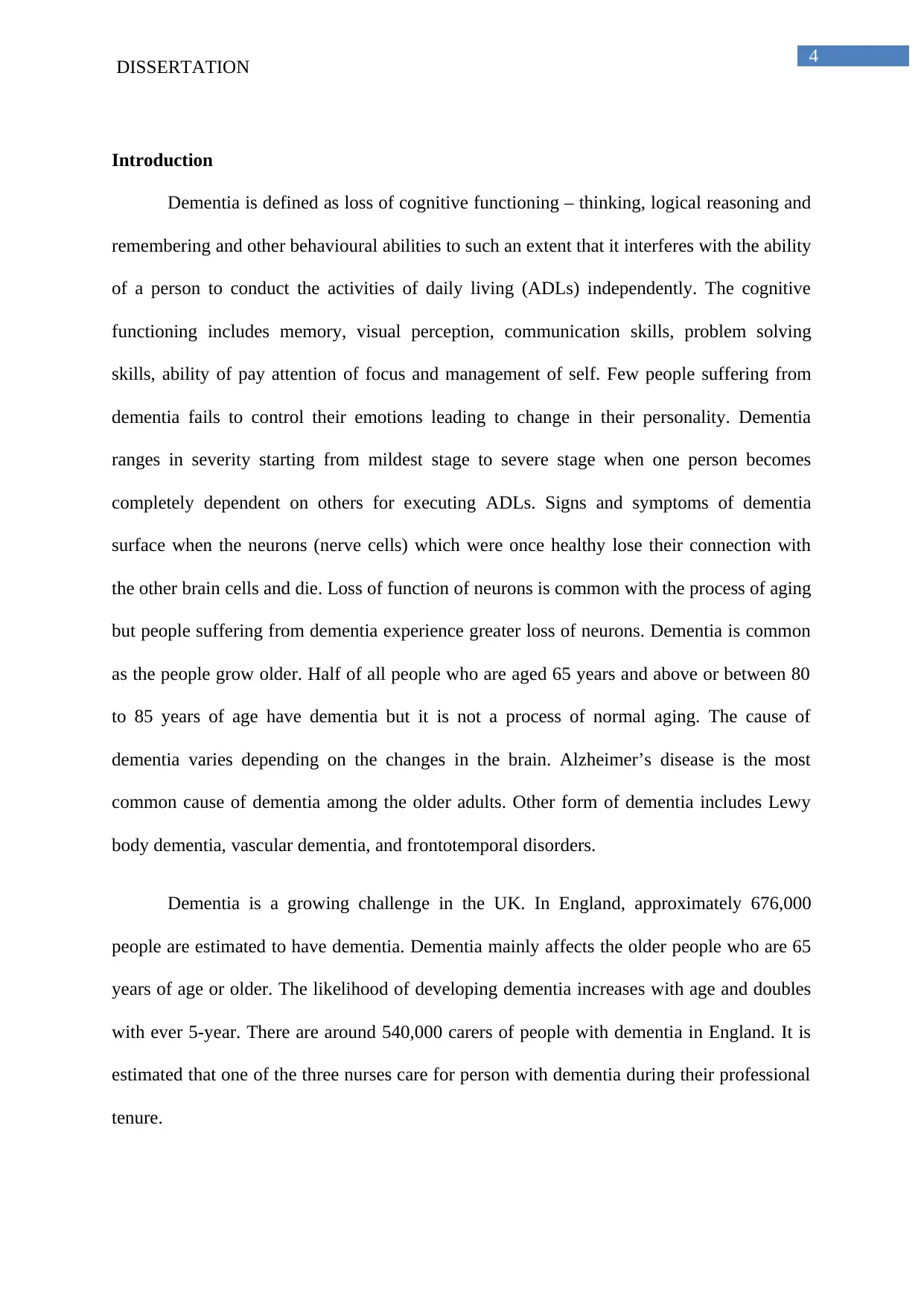
4
DISSERTATION
Introduction
Dementia is defined as loss of cognitive functioning – thinking, logical reasoning and
remembering and other behavioural abilities to such an extent that it interferes with the ability
of a person to conduct the activities of daily living (ADLs) independently. The cognitive
functioning includes memory, visual perception, communication skills, problem solving
skills, ability of pay attention of focus and management of self. Few people suffering from
dementia fails to control their emotions leading to change in their personality. Dementia
ranges in severity starting from mildest stage to severe stage when one person becomes
completely dependent on others for executing ADLs. Signs and symptoms of dementia
surface when the neurons (nerve cells) which were once healthy lose their connection with
the other brain cells and die. Loss of function of neurons is common with the process of aging
but people suffering from dementia experience greater loss of neurons. Dementia is common
as the people grow older. Half of all people who are aged 65 years and above or between 80
to 85 years of age have dementia but it is not a process of normal aging. The cause of
dementia varies depending on the changes in the brain. Alzheimer’s disease is the most
common cause of dementia among the older adults. Other form of dementia includes Lewy
body dementia, vascular dementia, and frontotemporal disorders.
Dementia is a growing challenge in the UK. In England, approximately 676,000
people are estimated to have dementia. Dementia mainly affects the older people who are 65
years of age or older. The likelihood of developing dementia increases with age and doubles
with ever 5-year. There are around 540,000 carers of people with dementia in England. It is
estimated that one of the three nurses care for person with dementia during their professional
tenure.
DISSERTATION
Introduction
Dementia is defined as loss of cognitive functioning – thinking, logical reasoning and
remembering and other behavioural abilities to such an extent that it interferes with the ability
of a person to conduct the activities of daily living (ADLs) independently. The cognitive
functioning includes memory, visual perception, communication skills, problem solving
skills, ability of pay attention of focus and management of self. Few people suffering from
dementia fails to control their emotions leading to change in their personality. Dementia
ranges in severity starting from mildest stage to severe stage when one person becomes
completely dependent on others for executing ADLs. Signs and symptoms of dementia
surface when the neurons (nerve cells) which were once healthy lose their connection with
the other brain cells and die. Loss of function of neurons is common with the process of aging
but people suffering from dementia experience greater loss of neurons. Dementia is common
as the people grow older. Half of all people who are aged 65 years and above or between 80
to 85 years of age have dementia but it is not a process of normal aging. The cause of
dementia varies depending on the changes in the brain. Alzheimer’s disease is the most
common cause of dementia among the older adults. Other form of dementia includes Lewy
body dementia, vascular dementia, and frontotemporal disorders.
Dementia is a growing challenge in the UK. In England, approximately 676,000
people are estimated to have dementia. Dementia mainly affects the older people who are 65
years of age or older. The likelihood of developing dementia increases with age and doubles
with ever 5-year. There are around 540,000 carers of people with dementia in England. It is
estimated that one of the three nurses care for person with dementia during their professional
tenure.
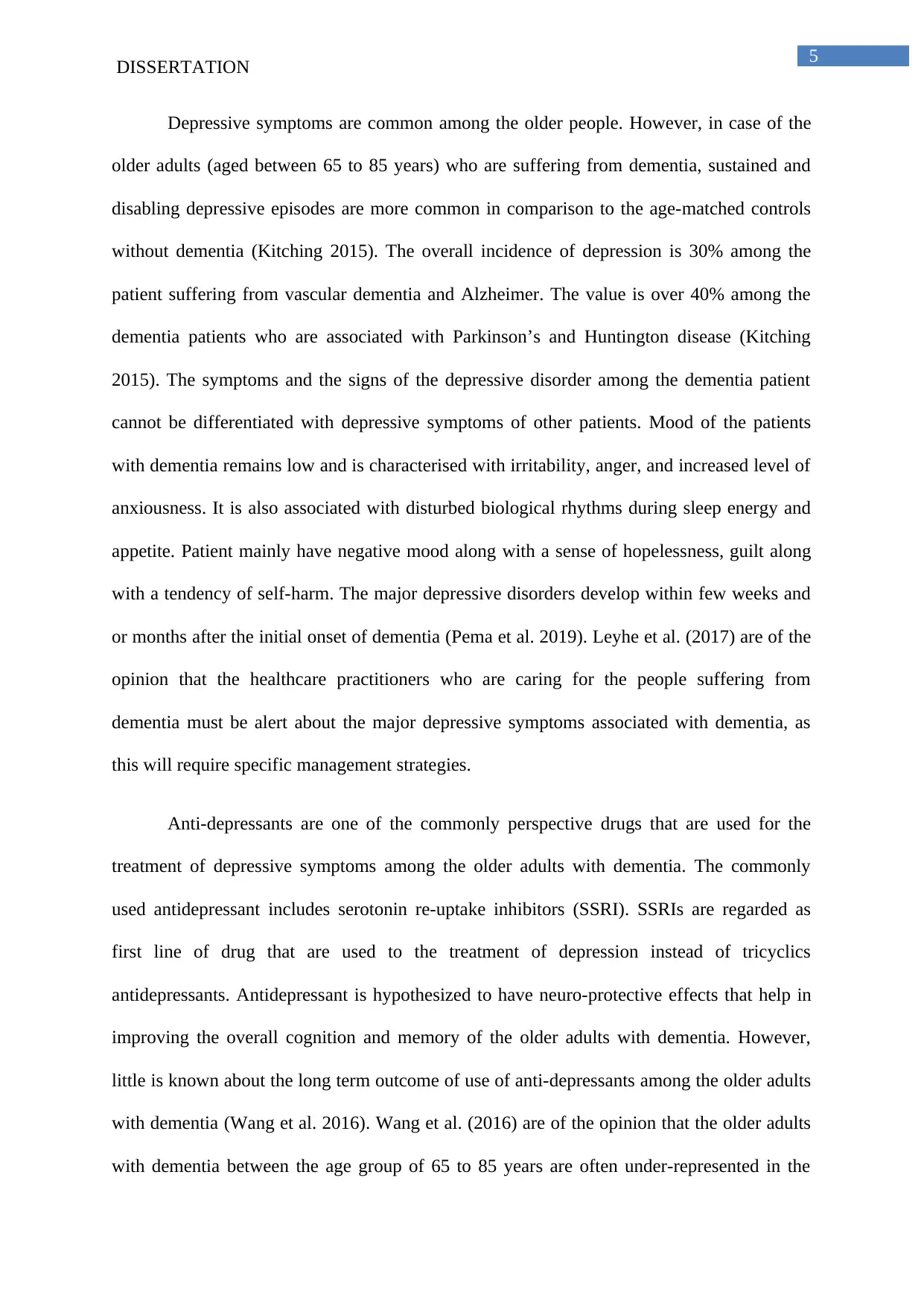
5
DISSERTATION
Depressive symptoms are common among the older people. However, in case of the
older adults (aged between 65 to 85 years) who are suffering from dementia, sustained and
disabling depressive episodes are more common in comparison to the age-matched controls
without dementia (Kitching 2015). The overall incidence of depression is 30% among the
patient suffering from vascular dementia and Alzheimer. The value is over 40% among the
dementia patients who are associated with Parkinson’s and Huntington disease (Kitching
2015). The symptoms and the signs of the depressive disorder among the dementia patient
cannot be differentiated with depressive symptoms of other patients. Mood of the patients
with dementia remains low and is characterised with irritability, anger, and increased level of
anxiousness. It is also associated with disturbed biological rhythms during sleep energy and
appetite. Patient mainly have negative mood along with a sense of hopelessness, guilt along
with a tendency of self-harm. The major depressive disorders develop within few weeks and
or months after the initial onset of dementia (Pema et al. 2019). Leyhe et al. (2017) are of the
opinion that the healthcare practitioners who are caring for the people suffering from
dementia must be alert about the major depressive symptoms associated with dementia, as
this will require specific management strategies.
Anti-depressants are one of the commonly perspective drugs that are used for the
treatment of depressive symptoms among the older adults with dementia. The commonly
used antidepressant includes serotonin re-uptake inhibitors (SSRI). SSRIs are regarded as
first line of drug that are used to the treatment of depression instead of tricyclics
antidepressants. Antidepressant is hypothesized to have neuro-protective effects that help in
improving the overall cognition and memory of the older adults with dementia. However,
little is known about the long term outcome of use of anti-depressants among the older adults
with dementia (Wang et al. 2016). Wang et al. (2016) are of the opinion that the older adults
with dementia between the age group of 65 to 85 years are often under-represented in the
DISSERTATION
Depressive symptoms are common among the older people. However, in case of the
older adults (aged between 65 to 85 years) who are suffering from dementia, sustained and
disabling depressive episodes are more common in comparison to the age-matched controls
without dementia (Kitching 2015). The overall incidence of depression is 30% among the
patient suffering from vascular dementia and Alzheimer. The value is over 40% among the
dementia patients who are associated with Parkinson’s and Huntington disease (Kitching
2015). The symptoms and the signs of the depressive disorder among the dementia patient
cannot be differentiated with depressive symptoms of other patients. Mood of the patients
with dementia remains low and is characterised with irritability, anger, and increased level of
anxiousness. It is also associated with disturbed biological rhythms during sleep energy and
appetite. Patient mainly have negative mood along with a sense of hopelessness, guilt along
with a tendency of self-harm. The major depressive disorders develop within few weeks and
or months after the initial onset of dementia (Pema et al. 2019). Leyhe et al. (2017) are of the
opinion that the healthcare practitioners who are caring for the people suffering from
dementia must be alert about the major depressive symptoms associated with dementia, as
this will require specific management strategies.
Anti-depressants are one of the commonly perspective drugs that are used for the
treatment of depressive symptoms among the older adults with dementia. The commonly
used antidepressant includes serotonin re-uptake inhibitors (SSRI). SSRIs are regarded as
first line of drug that are used to the treatment of depression instead of tricyclics
antidepressants. Antidepressant is hypothesized to have neuro-protective effects that help in
improving the overall cognition and memory of the older adults with dementia. However,
little is known about the long term outcome of use of anti-depressants among the older adults
with dementia (Wang et al. 2016). Wang et al. (2016) are of the opinion that the older adults
with dementia between the age group of 65 to 85 years are often under-represented in the
⊘ This is a preview!⊘
Do you want full access?
Subscribe today to unlock all pages.

Trusted by 1+ million students worldwide
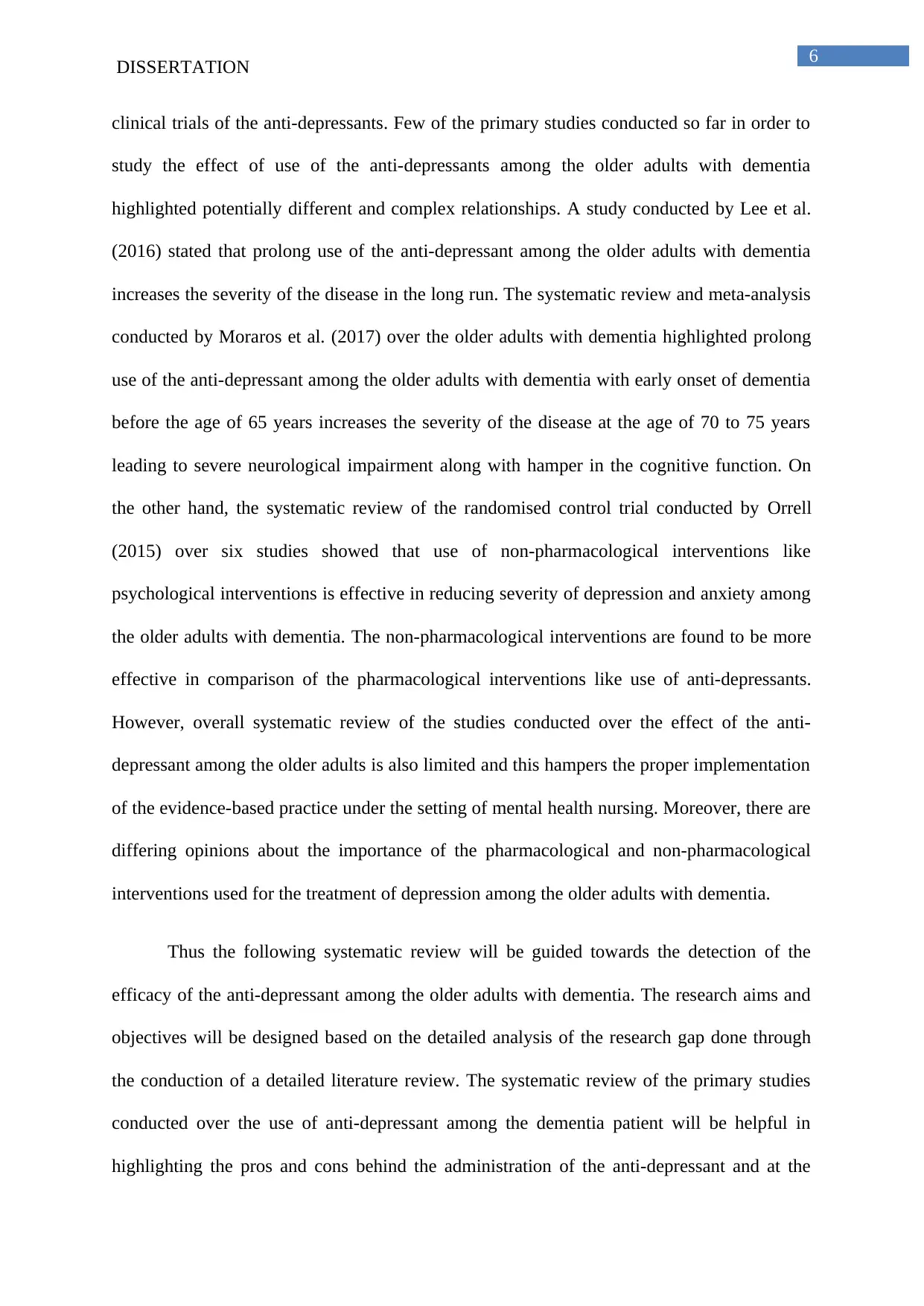
6
DISSERTATION
clinical trials of the anti-depressants. Few of the primary studies conducted so far in order to
study the effect of use of the anti-depressants among the older adults with dementia
highlighted potentially different and complex relationships. A study conducted by Lee et al.
(2016) stated that prolong use of the anti-depressant among the older adults with dementia
increases the severity of the disease in the long run. The systematic review and meta-analysis
conducted by Moraros et al. (2017) over the older adults with dementia highlighted prolong
use of the anti-depressant among the older adults with dementia with early onset of dementia
before the age of 65 years increases the severity of the disease at the age of 70 to 75 years
leading to severe neurological impairment along with hamper in the cognitive function. On
the other hand, the systematic review of the randomised control trial conducted by Orrell
(2015) over six studies showed that use of non-pharmacological interventions like
psychological interventions is effective in reducing severity of depression and anxiety among
the older adults with dementia. The non-pharmacological interventions are found to be more
effective in comparison of the pharmacological interventions like use of anti-depressants.
However, overall systematic review of the studies conducted over the effect of the anti-
depressant among the older adults is also limited and this hampers the proper implementation
of the evidence-based practice under the setting of mental health nursing. Moreover, there are
differing opinions about the importance of the pharmacological and non-pharmacological
interventions used for the treatment of depression among the older adults with dementia.
Thus the following systematic review will be guided towards the detection of the
efficacy of the anti-depressant among the older adults with dementia. The research aims and
objectives will be designed based on the detailed analysis of the research gap done through
the conduction of a detailed literature review. The systematic review of the primary studies
conducted over the use of anti-depressant among the dementia patient will be helpful in
highlighting the pros and cons behind the administration of the anti-depressant and at the
DISSERTATION
clinical trials of the anti-depressants. Few of the primary studies conducted so far in order to
study the effect of use of the anti-depressants among the older adults with dementia
highlighted potentially different and complex relationships. A study conducted by Lee et al.
(2016) stated that prolong use of the anti-depressant among the older adults with dementia
increases the severity of the disease in the long run. The systematic review and meta-analysis
conducted by Moraros et al. (2017) over the older adults with dementia highlighted prolong
use of the anti-depressant among the older adults with dementia with early onset of dementia
before the age of 65 years increases the severity of the disease at the age of 70 to 75 years
leading to severe neurological impairment along with hamper in the cognitive function. On
the other hand, the systematic review of the randomised control trial conducted by Orrell
(2015) over six studies showed that use of non-pharmacological interventions like
psychological interventions is effective in reducing severity of depression and anxiety among
the older adults with dementia. The non-pharmacological interventions are found to be more
effective in comparison of the pharmacological interventions like use of anti-depressants.
However, overall systematic review of the studies conducted over the effect of the anti-
depressant among the older adults is also limited and this hampers the proper implementation
of the evidence-based practice under the setting of mental health nursing. Moreover, there are
differing opinions about the importance of the pharmacological and non-pharmacological
interventions used for the treatment of depression among the older adults with dementia.
Thus the following systematic review will be guided towards the detection of the
efficacy of the anti-depressant among the older adults with dementia. The research aims and
objectives will be designed based on the detailed analysis of the research gap done through
the conduction of a detailed literature review. The systematic review of the primary studies
conducted over the use of anti-depressant among the dementia patient will be helpful in
highlighting the pros and cons behind the administration of the anti-depressant and at the
Paraphrase This Document
Need a fresh take? Get an instant paraphrase of this document with our AI Paraphraser
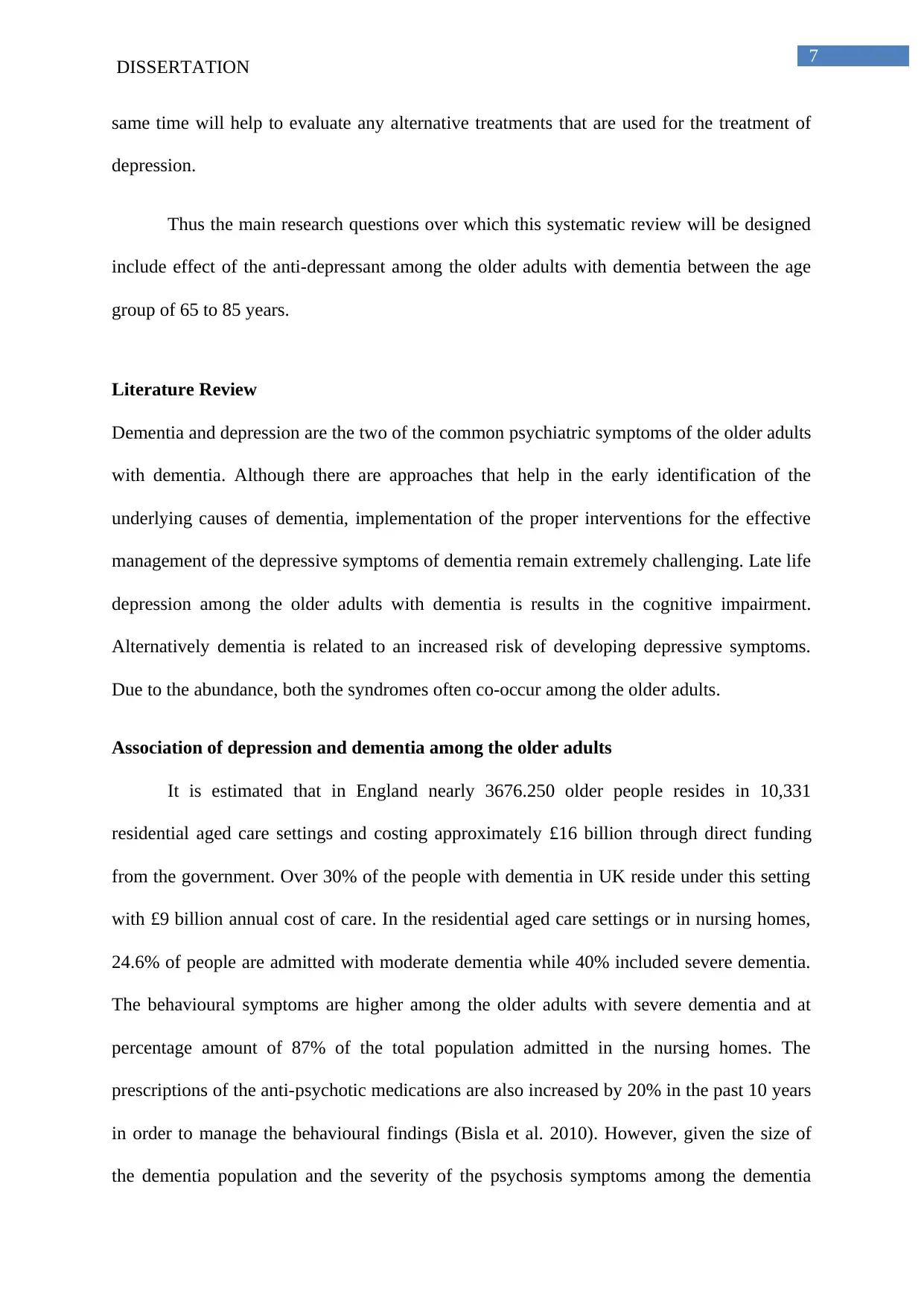
7
DISSERTATION
same time will help to evaluate any alternative treatments that are used for the treatment of
depression.
Thus the main research questions over which this systematic review will be designed
include effect of the anti-depressant among the older adults with dementia between the age
group of 65 to 85 years.
Literature Review
Dementia and depression are the two of the common psychiatric symptoms of the older adults
with dementia. Although there are approaches that help in the early identification of the
underlying causes of dementia, implementation of the proper interventions for the effective
management of the depressive symptoms of dementia remain extremely challenging. Late life
depression among the older adults with dementia is results in the cognitive impairment.
Alternatively dementia is related to an increased risk of developing depressive symptoms.
Due to the abundance, both the syndromes often co-occur among the older adults.
Association of depression and dementia among the older adults
It is estimated that in England nearly 3676.250 older people resides in 10,331
residential aged care settings and costing approximately £16 billion through direct funding
from the government. Over 30% of the people with dementia in UK reside under this setting
with £9 billion annual cost of care. In the residential aged care settings or in nursing homes,
24.6% of people are admitted with moderate dementia while 40% included severe dementia.
The behavioural symptoms are higher among the older adults with severe dementia and at
percentage amount of 87% of the total population admitted in the nursing homes. The
prescriptions of the anti-psychotic medications are also increased by 20% in the past 10 years
in order to manage the behavioural findings (Bisla et al. 2010). However, given the size of
the dementia population and the severity of the psychosis symptoms among the dementia
DISSERTATION
same time will help to evaluate any alternative treatments that are used for the treatment of
depression.
Thus the main research questions over which this systematic review will be designed
include effect of the anti-depressant among the older adults with dementia between the age
group of 65 to 85 years.
Literature Review
Dementia and depression are the two of the common psychiatric symptoms of the older adults
with dementia. Although there are approaches that help in the early identification of the
underlying causes of dementia, implementation of the proper interventions for the effective
management of the depressive symptoms of dementia remain extremely challenging. Late life
depression among the older adults with dementia is results in the cognitive impairment.
Alternatively dementia is related to an increased risk of developing depressive symptoms.
Due to the abundance, both the syndromes often co-occur among the older adults.
Association of depression and dementia among the older adults
It is estimated that in England nearly 3676.250 older people resides in 10,331
residential aged care settings and costing approximately £16 billion through direct funding
from the government. Over 30% of the people with dementia in UK reside under this setting
with £9 billion annual cost of care. In the residential aged care settings or in nursing homes,
24.6% of people are admitted with moderate dementia while 40% included severe dementia.
The behavioural symptoms are higher among the older adults with severe dementia and at
percentage amount of 87% of the total population admitted in the nursing homes. The
prescriptions of the anti-psychotic medications are also increased by 20% in the past 10 years
in order to manage the behavioural findings (Bisla et al. 2010). However, given the size of
the dementia population and the severity of the psychosis symptoms among the dementia
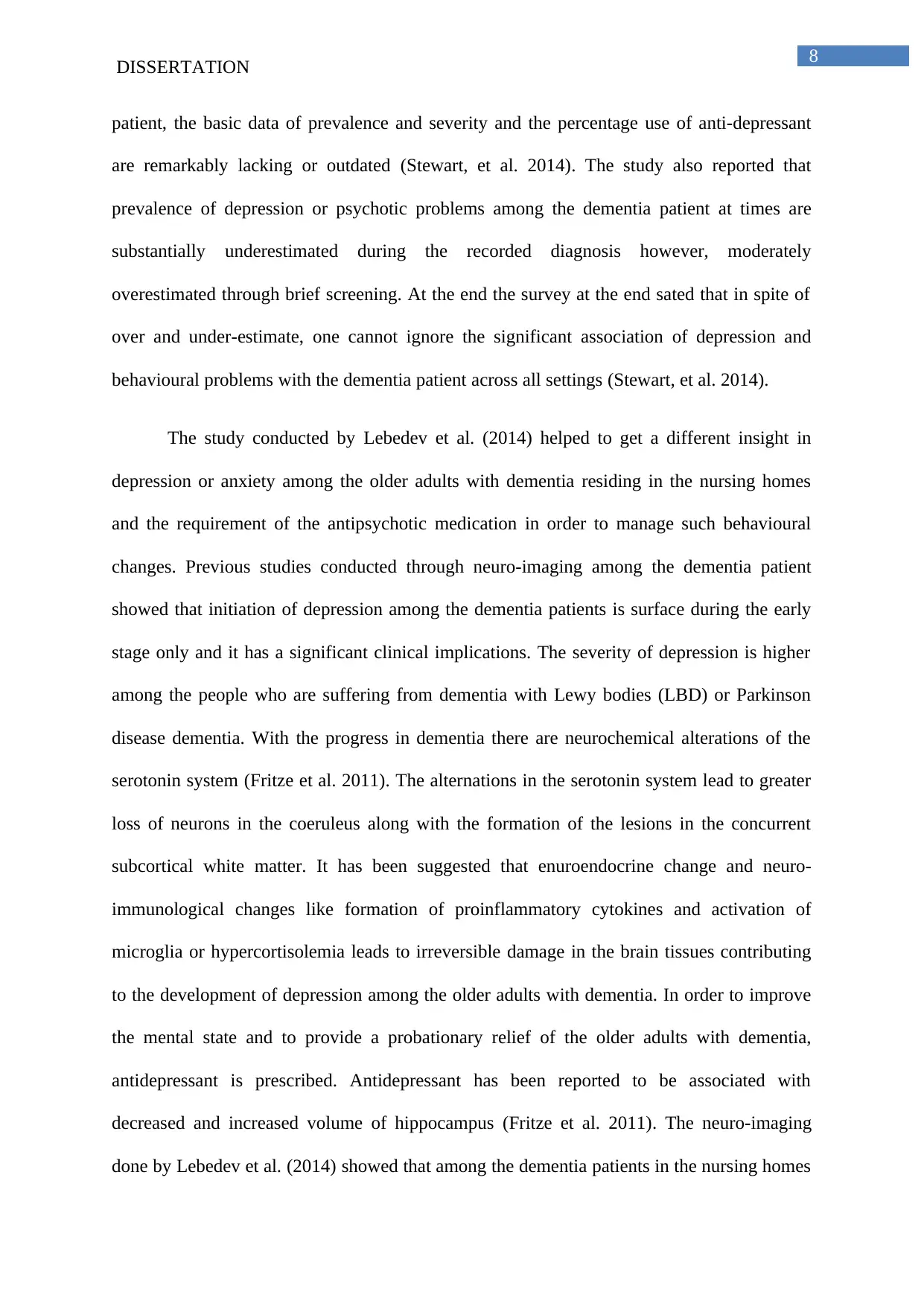
8
DISSERTATION
patient, the basic data of prevalence and severity and the percentage use of anti-depressant
are remarkably lacking or outdated (Stewart, et al. 2014). The study also reported that
prevalence of depression or psychotic problems among the dementia patient at times are
substantially underestimated during the recorded diagnosis however, moderately
overestimated through brief screening. At the end the survey at the end sated that in spite of
over and under-estimate, one cannot ignore the significant association of depression and
behavioural problems with the dementia patient across all settings (Stewart, et al. 2014).
The study conducted by Lebedev et al. (2014) helped to get a different insight in
depression or anxiety among the older adults with dementia residing in the nursing homes
and the requirement of the antipsychotic medication in order to manage such behavioural
changes. Previous studies conducted through neuro-imaging among the dementia patient
showed that initiation of depression among the dementia patients is surface during the early
stage only and it has a significant clinical implications. The severity of depression is higher
among the people who are suffering from dementia with Lewy bodies (LBD) or Parkinson
disease dementia. With the progress in dementia there are neurochemical alterations of the
serotonin system (Fritze et al. 2011). The alternations in the serotonin system lead to greater
loss of neurons in the coeruleus along with the formation of the lesions in the concurrent
subcortical white matter. It has been suggested that enuroendocrine change and neuro-
immunological changes like formation of proinflammatory cytokines and activation of
microglia or hypercortisolemia leads to irreversible damage in the brain tissues contributing
to the development of depression among the older adults with dementia. In order to improve
the mental state and to provide a probationary relief of the older adults with dementia,
antidepressant is prescribed. Antidepressant has been reported to be associated with
decreased and increased volume of hippocampus (Fritze et al. 2011). The neuro-imaging
done by Lebedev et al. (2014) showed that among the dementia patients in the nursing homes
DISSERTATION
patient, the basic data of prevalence and severity and the percentage use of anti-depressant
are remarkably lacking or outdated (Stewart, et al. 2014). The study also reported that
prevalence of depression or psychotic problems among the dementia patient at times are
substantially underestimated during the recorded diagnosis however, moderately
overestimated through brief screening. At the end the survey at the end sated that in spite of
over and under-estimate, one cannot ignore the significant association of depression and
behavioural problems with the dementia patient across all settings (Stewart, et al. 2014).
The study conducted by Lebedev et al. (2014) helped to get a different insight in
depression or anxiety among the older adults with dementia residing in the nursing homes
and the requirement of the antipsychotic medication in order to manage such behavioural
changes. Previous studies conducted through neuro-imaging among the dementia patient
showed that initiation of depression among the dementia patients is surface during the early
stage only and it has a significant clinical implications. The severity of depression is higher
among the people who are suffering from dementia with Lewy bodies (LBD) or Parkinson
disease dementia. With the progress in dementia there are neurochemical alterations of the
serotonin system (Fritze et al. 2011). The alternations in the serotonin system lead to greater
loss of neurons in the coeruleus along with the formation of the lesions in the concurrent
subcortical white matter. It has been suggested that enuroendocrine change and neuro-
immunological changes like formation of proinflammatory cytokines and activation of
microglia or hypercortisolemia leads to irreversible damage in the brain tissues contributing
to the development of depression among the older adults with dementia. In order to improve
the mental state and to provide a probationary relief of the older adults with dementia,
antidepressant is prescribed. Antidepressant has been reported to be associated with
decreased and increased volume of hippocampus (Fritze et al. 2011). The neuro-imaging
done by Lebedev et al. (2014) showed that among the dementia patients in the nursing homes
⊘ This is a preview!⊘
Do you want full access?
Subscribe today to unlock all pages.

Trusted by 1+ million students worldwide
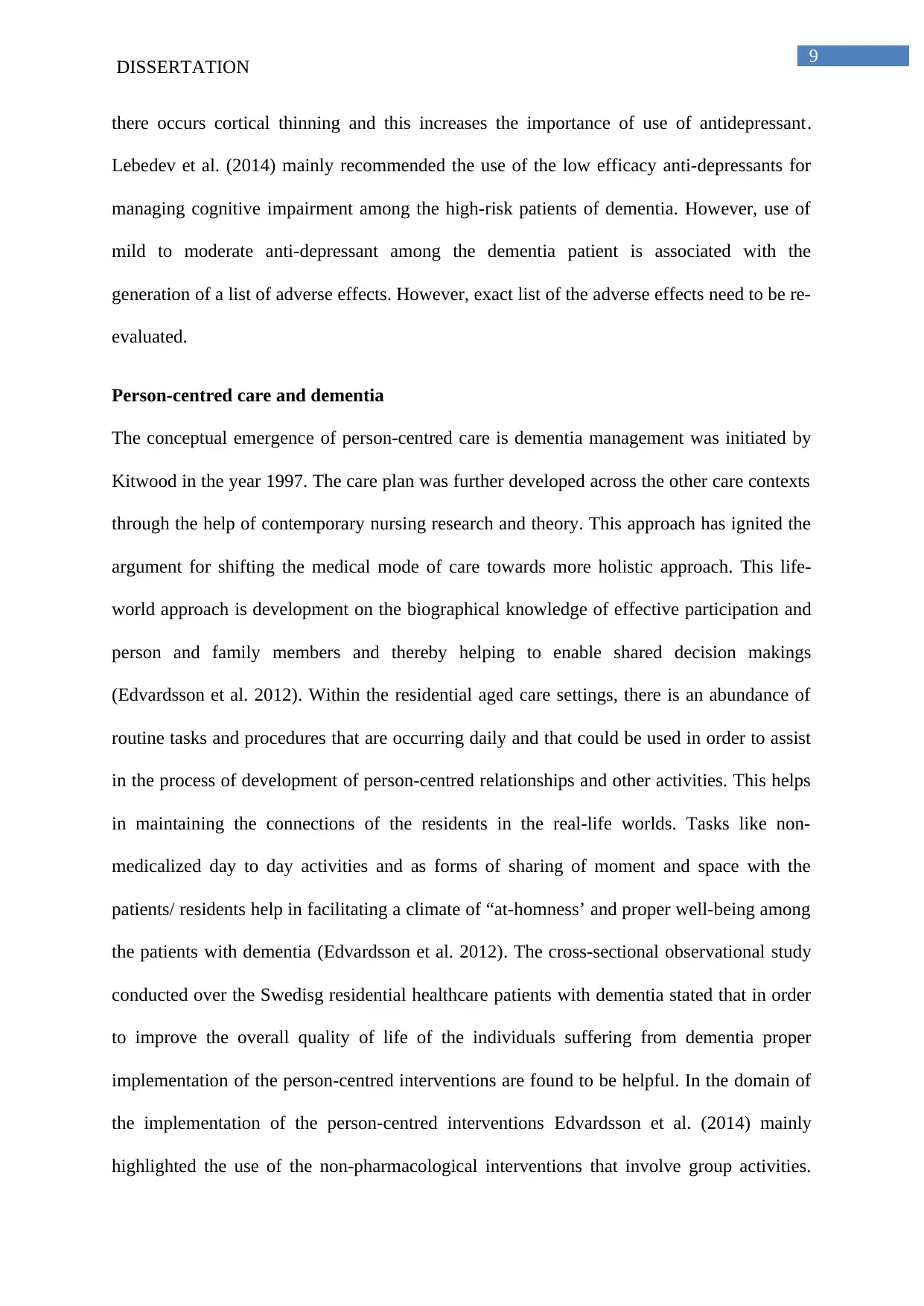
9
DISSERTATION
there occurs cortical thinning and this increases the importance of use of antidepressant.
Lebedev et al. (2014) mainly recommended the use of the low efficacy anti-depressants for
managing cognitive impairment among the high-risk patients of dementia. However, use of
mild to moderate anti-depressant among the dementia patient is associated with the
generation of a list of adverse effects. However, exact list of the adverse effects need to be re-
evaluated.
Person-centred care and dementia
The conceptual emergence of person-centred care is dementia management was initiated by
Kitwood in the year 1997. The care plan was further developed across the other care contexts
through the help of contemporary nursing research and theory. This approach has ignited the
argument for shifting the medical mode of care towards more holistic approach. This life-
world approach is development on the biographical knowledge of effective participation and
person and family members and thereby helping to enable shared decision makings
(Edvardsson et al. 2012). Within the residential aged care settings, there is an abundance of
routine tasks and procedures that are occurring daily and that could be used in order to assist
in the process of development of person-centred relationships and other activities. This helps
in maintaining the connections of the residents in the real-life worlds. Tasks like non-
medicalized day to day activities and as forms of sharing of moment and space with the
patients/ residents help in facilitating a climate of “at-homness’ and proper well-being among
the patients with dementia (Edvardsson et al. 2012). The cross-sectional observational study
conducted over the Swedisg residential healthcare patients with dementia stated that in order
to improve the overall quality of life of the individuals suffering from dementia proper
implementation of the person-centred interventions are found to be helpful. In the domain of
the implementation of the person-centred interventions Edvardsson et al. (2014) mainly
highlighted the use of the non-pharmacological interventions that involve group activities.
DISSERTATION
there occurs cortical thinning and this increases the importance of use of antidepressant.
Lebedev et al. (2014) mainly recommended the use of the low efficacy anti-depressants for
managing cognitive impairment among the high-risk patients of dementia. However, use of
mild to moderate anti-depressant among the dementia patient is associated with the
generation of a list of adverse effects. However, exact list of the adverse effects need to be re-
evaluated.
Person-centred care and dementia
The conceptual emergence of person-centred care is dementia management was initiated by
Kitwood in the year 1997. The care plan was further developed across the other care contexts
through the help of contemporary nursing research and theory. This approach has ignited the
argument for shifting the medical mode of care towards more holistic approach. This life-
world approach is development on the biographical knowledge of effective participation and
person and family members and thereby helping to enable shared decision makings
(Edvardsson et al. 2012). Within the residential aged care settings, there is an abundance of
routine tasks and procedures that are occurring daily and that could be used in order to assist
in the process of development of person-centred relationships and other activities. This helps
in maintaining the connections of the residents in the real-life worlds. Tasks like non-
medicalized day to day activities and as forms of sharing of moment and space with the
patients/ residents help in facilitating a climate of “at-homness’ and proper well-being among
the patients with dementia (Edvardsson et al. 2012). The cross-sectional observational study
conducted over the Swedisg residential healthcare patients with dementia stated that in order
to improve the overall quality of life of the individuals suffering from dementia proper
implementation of the person-centred interventions are found to be helpful. In the domain of
the implementation of the person-centred interventions Edvardsson et al. (2014) mainly
highlighted the use of the non-pharmacological interventions that involve group activities.
Paraphrase This Document
Need a fresh take? Get an instant paraphrase of this document with our AI Paraphraser
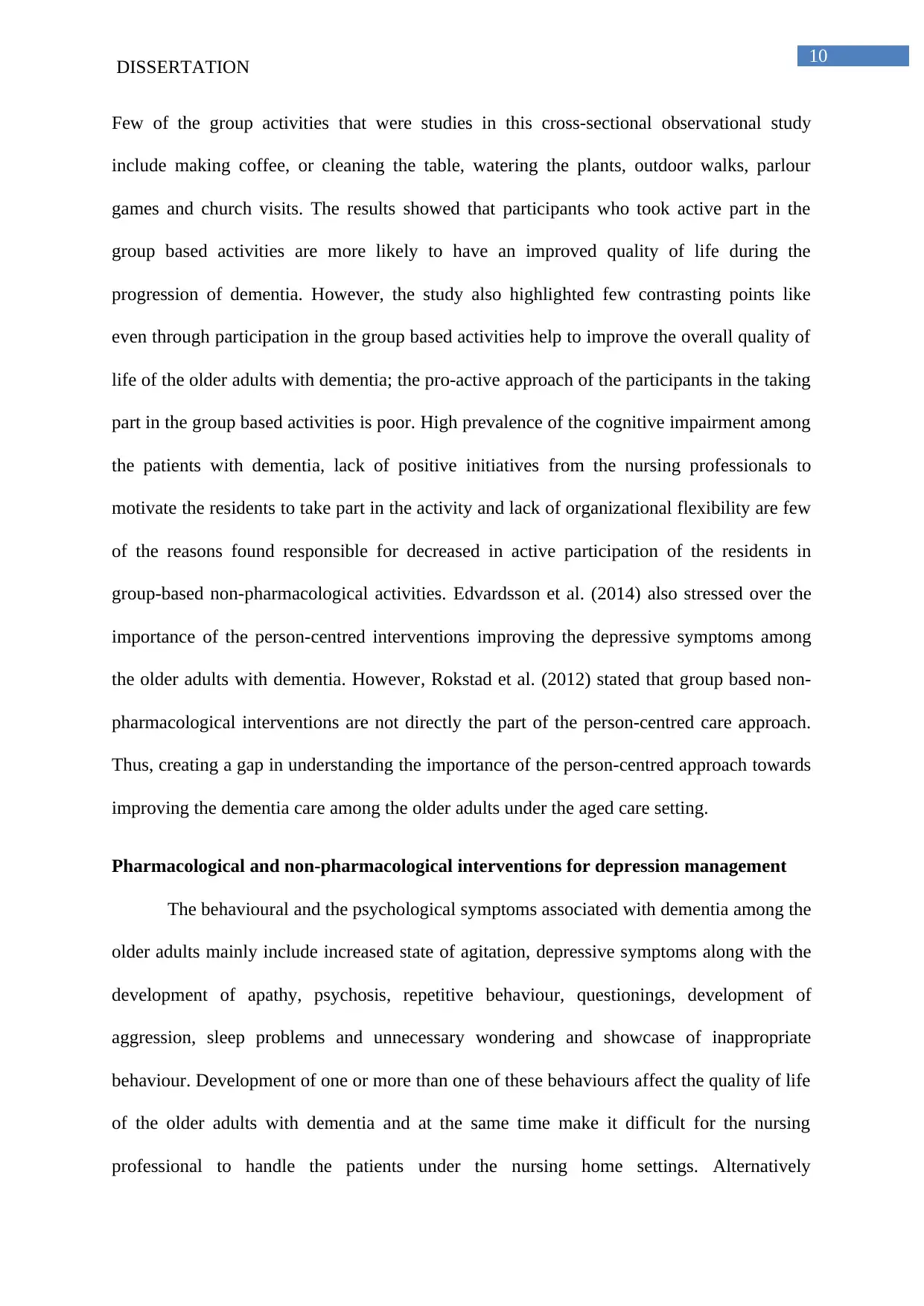
10
DISSERTATION
Few of the group activities that were studies in this cross-sectional observational study
include making coffee, or cleaning the table, watering the plants, outdoor walks, parlour
games and church visits. The results showed that participants who took active part in the
group based activities are more likely to have an improved quality of life during the
progression of dementia. However, the study also highlighted few contrasting points like
even through participation in the group based activities help to improve the overall quality of
life of the older adults with dementia; the pro-active approach of the participants in the taking
part in the group based activities is poor. High prevalence of the cognitive impairment among
the patients with dementia, lack of positive initiatives from the nursing professionals to
motivate the residents to take part in the activity and lack of organizational flexibility are few
of the reasons found responsible for decreased in active participation of the residents in
group-based non-pharmacological activities. Edvardsson et al. (2014) also stressed over the
importance of the person-centred interventions improving the depressive symptoms among
the older adults with dementia. However, Rokstad et al. (2012) stated that group based non-
pharmacological interventions are not directly the part of the person-centred care approach.
Thus, creating a gap in understanding the importance of the person-centred approach towards
improving the dementia care among the older adults under the aged care setting.
Pharmacological and non-pharmacological interventions for depression management
The behavioural and the psychological symptoms associated with dementia among the
older adults mainly include increased state of agitation, depressive symptoms along with the
development of apathy, psychosis, repetitive behaviour, questionings, development of
aggression, sleep problems and unnecessary wondering and showcase of inappropriate
behaviour. Development of one or more than one of these behaviours affect the quality of life
of the older adults with dementia and at the same time make it difficult for the nursing
professional to handle the patients under the nursing home settings. Alternatively
DISSERTATION
Few of the group activities that were studies in this cross-sectional observational study
include making coffee, or cleaning the table, watering the plants, outdoor walks, parlour
games and church visits. The results showed that participants who took active part in the
group based activities are more likely to have an improved quality of life during the
progression of dementia. However, the study also highlighted few contrasting points like
even through participation in the group based activities help to improve the overall quality of
life of the older adults with dementia; the pro-active approach of the participants in the taking
part in the group based activities is poor. High prevalence of the cognitive impairment among
the patients with dementia, lack of positive initiatives from the nursing professionals to
motivate the residents to take part in the activity and lack of organizational flexibility are few
of the reasons found responsible for decreased in active participation of the residents in
group-based non-pharmacological activities. Edvardsson et al. (2014) also stressed over the
importance of the person-centred interventions improving the depressive symptoms among
the older adults with dementia. However, Rokstad et al. (2012) stated that group based non-
pharmacological interventions are not directly the part of the person-centred care approach.
Thus, creating a gap in understanding the importance of the person-centred approach towards
improving the dementia care among the older adults under the aged care setting.
Pharmacological and non-pharmacological interventions for depression management
The behavioural and the psychological symptoms associated with dementia among the
older adults mainly include increased state of agitation, depressive symptoms along with the
development of apathy, psychosis, repetitive behaviour, questionings, development of
aggression, sleep problems and unnecessary wondering and showcase of inappropriate
behaviour. Development of one or more than one of these behaviours affect the quality of life
of the older adults with dementia and at the same time make it difficult for the nursing
professional to handle the patients under the nursing home settings. Alternatively
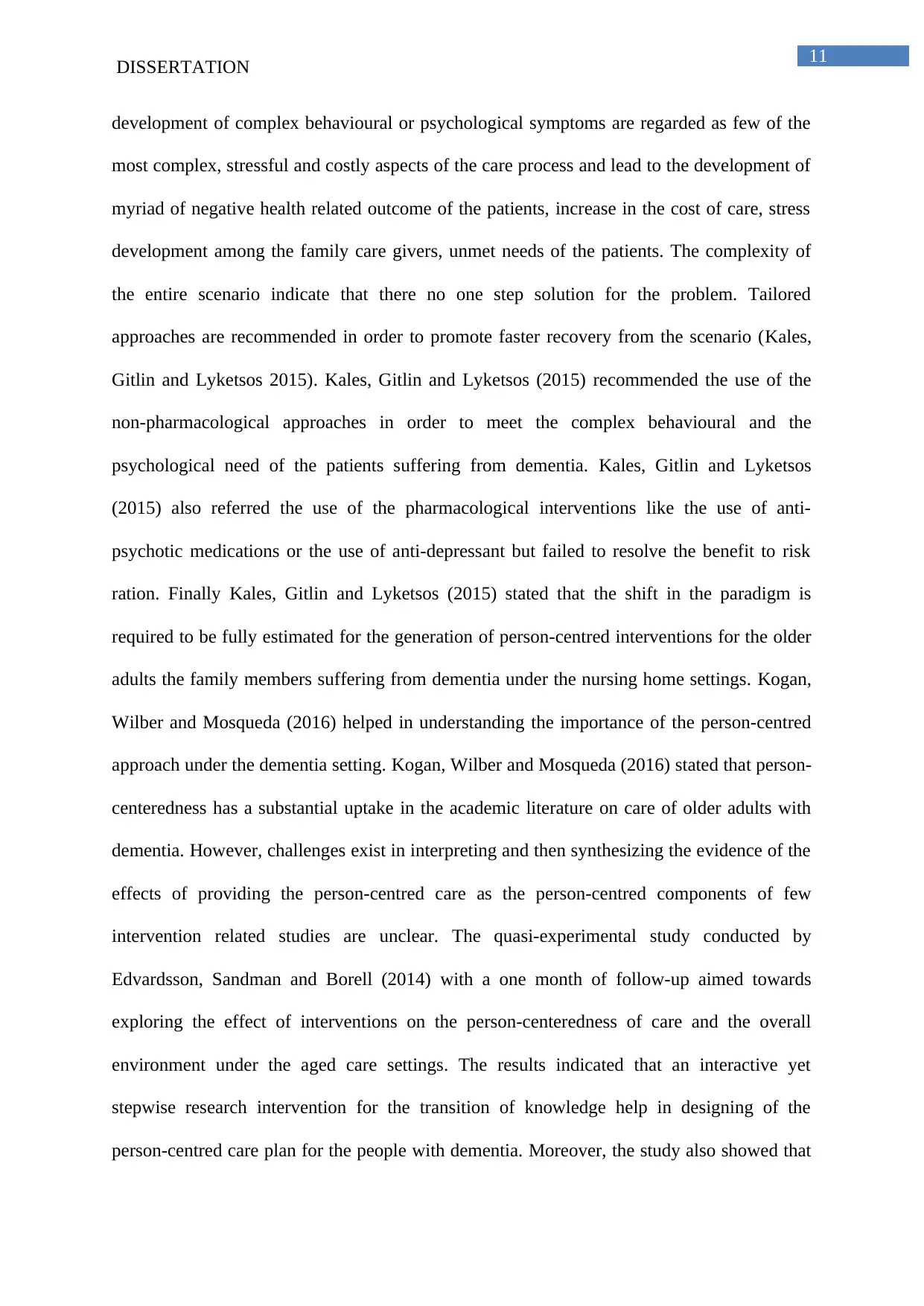
11
DISSERTATION
development of complex behavioural or psychological symptoms are regarded as few of the
most complex, stressful and costly aspects of the care process and lead to the development of
myriad of negative health related outcome of the patients, increase in the cost of care, stress
development among the family care givers, unmet needs of the patients. The complexity of
the entire scenario indicate that there no one step solution for the problem. Tailored
approaches are recommended in order to promote faster recovery from the scenario (Kales,
Gitlin and Lyketsos 2015). Kales, Gitlin and Lyketsos (2015) recommended the use of the
non-pharmacological approaches in order to meet the complex behavioural and the
psychological need of the patients suffering from dementia. Kales, Gitlin and Lyketsos
(2015) also referred the use of the pharmacological interventions like the use of anti-
psychotic medications or the use of anti-depressant but failed to resolve the benefit to risk
ration. Finally Kales, Gitlin and Lyketsos (2015) stated that the shift in the paradigm is
required to be fully estimated for the generation of person-centred interventions for the older
adults the family members suffering from dementia under the nursing home settings. Kogan,
Wilber and Mosqueda (2016) helped in understanding the importance of the person-centred
approach under the dementia setting. Kogan, Wilber and Mosqueda (2016) stated that person-
centeredness has a substantial uptake in the academic literature on care of older adults with
dementia. However, challenges exist in interpreting and then synthesizing the evidence of the
effects of providing the person-centred care as the person-centred components of few
intervention related studies are unclear. The quasi-experimental study conducted by
Edvardsson, Sandman and Borell (2014) with a one month of follow-up aimed towards
exploring the effect of interventions on the person-centeredness of care and the overall
environment under the aged care settings. The results indicated that an interactive yet
stepwise research intervention for the transition of knowledge help in designing of the
person-centred care plan for the people with dementia. Moreover, the study also showed that
DISSERTATION
development of complex behavioural or psychological symptoms are regarded as few of the
most complex, stressful and costly aspects of the care process and lead to the development of
myriad of negative health related outcome of the patients, increase in the cost of care, stress
development among the family care givers, unmet needs of the patients. The complexity of
the entire scenario indicate that there no one step solution for the problem. Tailored
approaches are recommended in order to promote faster recovery from the scenario (Kales,
Gitlin and Lyketsos 2015). Kales, Gitlin and Lyketsos (2015) recommended the use of the
non-pharmacological approaches in order to meet the complex behavioural and the
psychological need of the patients suffering from dementia. Kales, Gitlin and Lyketsos
(2015) also referred the use of the pharmacological interventions like the use of anti-
psychotic medications or the use of anti-depressant but failed to resolve the benefit to risk
ration. Finally Kales, Gitlin and Lyketsos (2015) stated that the shift in the paradigm is
required to be fully estimated for the generation of person-centred interventions for the older
adults the family members suffering from dementia under the nursing home settings. Kogan,
Wilber and Mosqueda (2016) helped in understanding the importance of the person-centred
approach under the dementia setting. Kogan, Wilber and Mosqueda (2016) stated that person-
centeredness has a substantial uptake in the academic literature on care of older adults with
dementia. However, challenges exist in interpreting and then synthesizing the evidence of the
effects of providing the person-centred care as the person-centred components of few
intervention related studies are unclear. The quasi-experimental study conducted by
Edvardsson, Sandman and Borell (2014) with a one month of follow-up aimed towards
exploring the effect of interventions on the person-centeredness of care and the overall
environment under the aged care settings. The results indicated that an interactive yet
stepwise research intervention for the transition of knowledge help in designing of the
person-centred care plan for the people with dementia. Moreover, the study also showed that
⊘ This is a preview!⊘
Do you want full access?
Subscribe today to unlock all pages.

Trusted by 1+ million students worldwide
1 out of 52
Related Documents
Your All-in-One AI-Powered Toolkit for Academic Success.
+13062052269
info@desklib.com
Available 24*7 on WhatsApp / Email
![[object Object]](/_next/static/media/star-bottom.7253800d.svg)
Unlock your academic potential
Copyright © 2020–2026 A2Z Services. All Rights Reserved. Developed and managed by ZUCOL.





